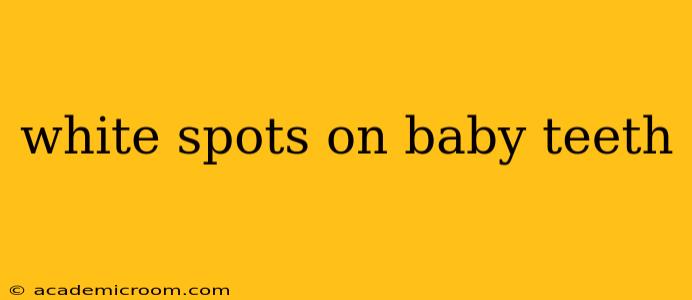White spots on baby teeth are a common concern for parents. While they can sometimes be a simple cosmetic issue, they can also indicate underlying dental problems. Understanding the causes, treatment options, and preventative measures is crucial for maintaining your child's oral health. This comprehensive guide will address your concerns and provide you with the information you need to make informed decisions about your child's dental care.
What Causes White Spots on Baby Teeth?
Several factors can contribute to the appearance of white spots on baby teeth. These range from relatively harmless conditions to more serious dental issues. Let's explore the most common causes:
-
Hypoplasia: This is a developmental defect where the enamel doesn't form properly during tooth development. It can result in white spots or patches of varying sizes and intensities. Causes can include illnesses during pregnancy, premature birth, nutritional deficiencies, or certain medications taken during pregnancy or by the child.
-
Fluorosis: Excessive fluoride intake during tooth development can lead to white spots, or even more severe discoloration. This is more common in areas with fluoridated water, where children may ingest excessive fluoride through drinking water or swallowing toothpaste.
-
Early Childhood Caries (ECC): While often manifesting as cavities, the early stages of ECC can appear as white spots on the tooth surface. These are demineralized areas of enamel, indicating the beginning of tooth decay. Prompt treatment is crucial to prevent the progression of cavities.
-
Trauma: An injury to a developing tooth can sometimes result in white spots or discoloration. This is typically localized to the affected area.
-
Medication Side Effects: Certain medications can sometimes cause changes in tooth enamel, resulting in white spots.
Are White Spots on Baby Teeth Serious?
The seriousness of white spots on baby teeth depends entirely on the underlying cause. While some causes, like mild fluorosis or minor hypoplasia, may be purely cosmetic, others, such as early childhood caries, require prompt dental intervention to prevent further damage.
It's crucial to consult a dentist or pediatric dentist to determine the cause of the white spots. They can conduct a thorough examination to identify the underlying issue and recommend the appropriate course of action.
How Are White Spots on Baby Teeth Treated?
Treatment for white spots on baby teeth varies depending on the cause and severity. Options include:
-
Monitoring: In cases of mild fluorosis or hypoplasia that aren't causing any problems, the dentist may simply monitor the spots for any changes.
-
Professional Cleaning: Regular professional cleanings can help remove surface stains and improve the overall appearance of the teeth.
-
Fluoride Treatments: For early childhood caries or enamel demineralization, fluoride treatments can help remineralize the teeth and strengthen the enamel.
-
Dental Fillings (in cases of cavities): If the white spots indicate the presence of cavities, fillings may be necessary to prevent further decay.
-
Dental Bonding or Veneers (for cosmetic purposes): In some cases, cosmetic procedures like bonding or veneers may be considered to improve the appearance of the white spots, but this is typically not recommended for baby teeth unless there is significant esthetic concern.
How Can I Prevent White Spots on My Baby's Teeth?
Prevention is key to maintaining your child's oral health. Here are some preventative measures you can take:
-
Proper Oral Hygiene: Brush your child's teeth twice a day with a fluoride toothpaste (pea-sized amount for children under 6). Begin cleaning their teeth as soon as they erupt.
-
Healthy Diet: Limit sugary drinks and snacks. Encourage a diet rich in fruits, vegetables, and whole grains.
-
Fluoride Supplementation: Discuss fluoride supplementation with your pediatrician or dentist, especially if your water isn't fluoridated or if your child is at risk for cavities.
-
Regular Dental Checkups: Schedule regular dental checkups for your child starting around age 1 or when their first tooth erupts. Early detection and intervention are crucial.
Will White Spots on Baby Teeth Affect Adult Teeth?
While white spots on baby teeth themselves won't directly affect the adult teeth, the underlying cause might. For instance, severe ECC can lead to permanent damage to the underlying adult teeth. Addressing the root cause of the white spots in baby teeth is essential to protect the development and health of the permanent teeth.
What If My Baby Swallows Toothpaste?
Swallowing a small amount of fluoride toothpaste is generally not harmful. However, excessive ingestion of fluoride can contribute to fluorosis. Ensure you only use a pea-sized amount of fluoride toothpaste for children under 6, and supervise their brushing to minimize swallowing.
By understanding the causes, treatments, and prevention strategies for white spots on baby teeth, you can proactively protect your child's oral health and ensure a bright, healthy smile. Remember, regular dental checkups are vital for early detection and intervention.
